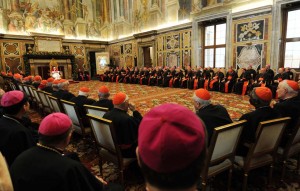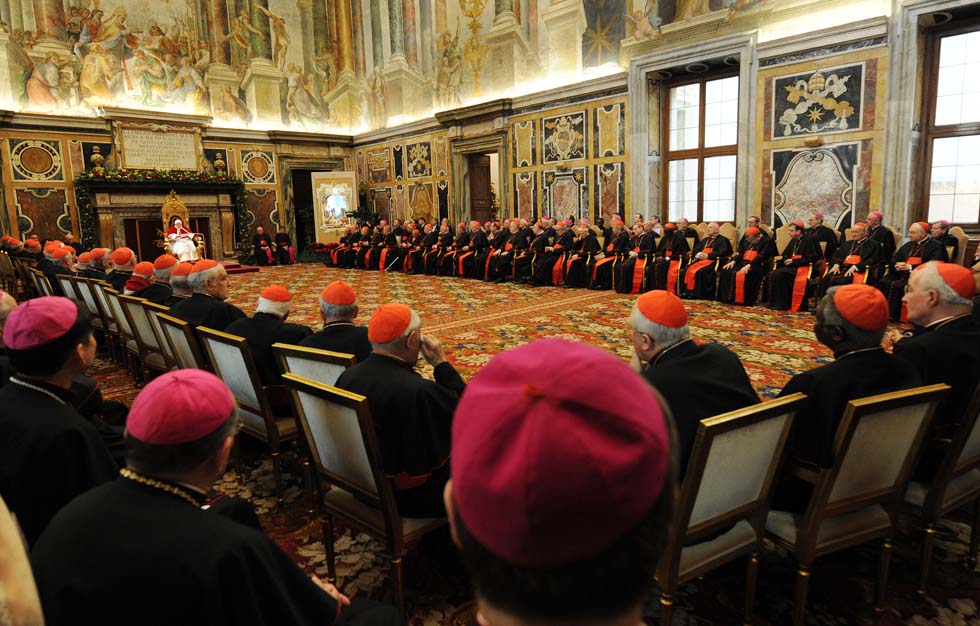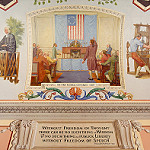 One of the key goals of Pope Francis’s papacy has been the reform of the Curia, the Vatican bureaucracy responsible for overseeing important aspects of the life of the Catholic Church. Indeed the cardinal electors who chose him in 2013 did so in part to fulfill that purpose. This past December, Francis gave a scathing speech to the Curia, outlining some of the problems he sees in its day-to-day operations. Now this past Saturday, Jayme Lemke and William Shughart, two professors of economics at Utah State University, in an article published at National Review Online called “The Pope Should Read Public Choice Theory,” offer their assistance to the pope in his endeavor to clean up the Curia, suggesting that he study public choice theory to better understand how a bureaucracy operates and becomes dysfunctional. I am strongly in favor of dialogue between Catholic theology and the social sciences, but in this case I think Lemke and Shughart have it backwards; public choice theorists would do well to study the writings of the last few popes to gain a deeper understanding of human behavior than the narrow one offered by their own theory.
One of the key goals of Pope Francis’s papacy has been the reform of the Curia, the Vatican bureaucracy responsible for overseeing important aspects of the life of the Catholic Church. Indeed the cardinal electors who chose him in 2013 did so in part to fulfill that purpose. This past December, Francis gave a scathing speech to the Curia, outlining some of the problems he sees in its day-to-day operations. Now this past Saturday, Jayme Lemke and William Shughart, two professors of economics at Utah State University, in an article published at National Review Online called “The Pope Should Read Public Choice Theory,” offer their assistance to the pope in his endeavor to clean up the Curia, suggesting that he study public choice theory to better understand how a bureaucracy operates and becomes dysfunctional. I am strongly in favor of dialogue between Catholic theology and the social sciences, but in this case I think Lemke and Shughart have it backwards; public choice theorists would do well to study the writings of the last few popes to gain a deeper understanding of human behavior than the narrow one offered by their own theory.
In a nutshell, public choice theory takes the model for human behavior used in mainstream economics and applies it to other areas of life, typically, although not exclusively, the political sphere (when applied outside the realm of politics, the broader term “rational choice theory” is typically used instead). In mainstream microeconomics, economic actors behave in a self-interested manner, acting on a set of given (“exogenous,” that is, determined outside the economic system itself) preferences. The marketplace can shape people’s behavior through a set of constraints (e.g., the movie I wanted to watch at the theater is sold out, so I have to watch another one), but market interactions do not determine what people’s interests are. Public choice theory applies this theory of human behavior to other aspects of life. For example, public choice theorists can apply this microeconomic model to voting behavior during elections, suggesting that voters make electoral choices that will best promote their self-interest. The Nobel Prize-winning economist Gary Becker famously applied this theory to family life, arguing for example that mothers make the choice of entering the workforce or staying home with their children by weighing the “opportunity costs” of the two options. Lemke and Shughart appeal to Gordon Tullock’s work on bureaucracy, in which he provided an explanation of why bureaucracies seem to develop interests of their own, often at cross-purposes with the public goods they are meant to serve.
Now the odd thing about Lemke and Shughart’s advice to Pope Francis is that almost every insight into bureaucracy drawn from public choice theory that they offer is prefaced with a quotation from Francis’s speech to the Curia making almost exactly the same point. It is not at all clear why, after reading Lemke and Shughart’s article, Francis needs to study public choice theory; his Christian formation, training in Ignatian spirituality, and many years of pastoral experience seem to have given him a pretty good understanding of human behavior and the workings of bureaucracy. Although Lemke and Shughart’s advice is unneeded, my thesis is much stronger, that in fact it is positively harmful, for three reasons: it is inadequate as a methodology for understanding human behavior; it proposes an overly-narrow view of human motivations; and it risks exporting the logic of the marketplace to areas of life where such logic is inappropriate. I will do a bit of prefacing of my own, beginning each criticism with quotations from Francis’s three predecessors, Paul VI, John Paul II, and Benedict XVI.
Culture is a specific way of man’s ‘existing’ and ‘being.’ Man always lives according to a culture which is specifically his, and which, in its turn, creates among men a tie which is also specifically theirs, determining the inter-human and social character of human existence. – Pope John Paul II, Address to UNESCO, 1980
Although this passage is dense, what John Paul is saying is that whatever a person does, they are shaped by culture, the web of values, identities, and meanings that makes life as a person possible. While it is deeply personal, John Paul also points out that culture is inherently social; we learn culture from others, and engage in meaningful activity together with others who share our understanding of the meaning of our actions.
John Paul is speaking of “culture” on a very large scale, but his point also applies to the relatively small scale institutions often studied by public choice theory (such as the Roman Curia), which undoubtedly have “cultures” of their own. The people who work in these institutions engage in a number of complex practices aimed at a set of goals peculiar to that institution, and it requires a certain amount of training or initiation to truly understand those practices. For example, it takes several years of graduate school and even a few years on the tenure track to really think and act “like a professor”; there is surely a similar process of initiation into the ways of the curial bureaucrat.
The problem for public choice theory here is that it makes no room for this process in understanding human behavior. For example, Lemke and Shughart claim that “the primary objective of any bureaucrat is survival.” This may seem plausible on the surface, but consider how complex what they actually mean by “survival” is. Surely it is more than physical survival; it has something to do with employment and status. Even then, “survival” will mean something quite different in different institutional settings; survival for a professor, a professional football player, and a bureaucrat require very different sorts of behaviors and different sorts of knowledge, and even the bureaucrat in the Department of Homeland Security and that in the Curia are not the same. And the decisive point here is that a person doesn’t really understand what “survival” means in these different institutional settings without taking part in them, without being initiated. Public choice theory sets out to explain patterns of institutional behavior in terms of the individual desire for survival, but it turns out that the reverse is necessary, we need to understand patterns of institutional behavior to really understand individual survival in a social setting.
This problem is endemic to public choice theory because of its methodological individualism, that is, its insistence on explaining social behavior in terms of individual behavioral characteristics assumed as givens. Often public choice theorists attempt to explain complex social behaviors using game theory, the use of “games” to explain how social interactions can lead individuals to behave in ways different than they would on their own. Probably the most famous game is the Prisoner’s Dilemma, which proposes that two criminals are arrested on lesser charges, and each has the opportunity to snitch on the other regarding a more serious crime in return for a shorter sentence. Therefore, three possibilities arise: both prisoners could snitch, leading to convictions for both on the more serious charge but medium sentences; both could remain silent, leading to shorter sentences for both on the lesser charge; and one could snitch and the other remain silent, leading to the snitch receiving a short sentence on the lesser charge and the silent prisoner receiving the longest sentence for the more serious charge. Basic game theory suggests that this game inevitably leads to the first outcome, as both prisoners seek to avoid being the patsy in the last option. At first glance the second, more cooperative, option seems most rational, but the point is that the rules of the game, the institutional setting, change the calculus, making remaining silent an irrational choice for both prisoners.
The Prisoner’s Dilemma, however, demonstrates the central flaw of all rational choice theorizing. As the economist Alexander Field writes, “Although one can investigate with game theory the dilemmas possibly faced by two prisoners, one should not expect from such a theory an explanation for why escape or insurrection is not part of the strategy space.” The narrative implicitly limits the choices available to the prisoners. What Field is slyly suggesting is that a theory meant to explain how rules and patterns of behavior come to be depends on a set of rules and patterns of behavior that remain presupposed, hidden from view, unexplained, and unexplainable, by the theory.
Methodological necessity and ideological presuppositions too often lead the human sciences to isolate, in the various situations, certain aspects of man, and yet to give these an explanation which claims to be complete or at least an interpretation which is meant to be all-embracing from a purely quantitative or phenomenological point of view. This scientific reduction betrays a dangerous presupposition. To give a privileged position in this way to such an aspect of analysis is to mutilate man and, under the pretext of a scientific procedure, to make it impossible to understand man in his totality. – Pope Paul VI, Octogesima Adveniens (1971) #38
Besides using a notion of “survival” that smuggles in the sort of bureaucratic behavior it is meant to explain, Lemke and Shughart also unjustifiably narrow the scope of human motivations to “survival.” Earlier in the essay they even claim that all people are “motivated primarily by self-interest.” As Pope Paul VI suggests, a method for studying human behavior that is unduly reductionist risks distorting our understanding rather than enhancing it. Even a cursory glance at the world around us reveals a wide variety of human motives, some self-interested, some altruistic and self-sacrificing. Could Mother Teresa and the Missionaries of Charity really be explained by public choice theory? Rational choice theorists of all stripes often seem to want it both ways: while claiming that “self-interest” is a relatively empty category, simply reflecting what is of interest to the person, whether selfish or altruistic, when it comes time for practical application, as in Lemke and Shughart’s case, “self-interest” comes to mean something specific and narrow. Others claim that the self-interested individual is not meant to be an accurate description of reality, but rather a theoretical model valuable for its analytic or predictive power. Yet it seems odd to develop a model so divorced from the reality, and whatever predictive power the models have comes, as I argued in the previous section, from their circularity, from assuming in the model things it is meant to explain.
The economy in fact is only one aspect and one dimension of the whole of human activity. If economic life is absolutized, if the production and consumption of goods become the center of social life and society’s only value, not subject to any other value, the reason is to be found not so much in the economic system itself as in the fact that the entire socio-cultural system, by ignoring the ethical and religious dimension, has been weakened, and ends by limiting itself to the production of goods and services alone. – Pope John Paul II, Centesimus Annus (1991) #39
The economy in the global era seems to privilege the former logic, that of contractual exchange, but directly or indirectly it also demonstrates its need for the other two: political logic, and the logic of the unconditional gift. – Pope Benedict XVI, Caritas in Veritate (2009) #37
The third and final problem with public choice theory is that it risks bringing the logic of the marketplace to areas of life where this would be harmful rather than beneficial to our well-being. Would we really be better off thinking of our relationships with our loved ones as commodities? Would it be beneficial to think of the Catholic Church like a corporation seeking its own self-interest? This seems to be the sort of thing Pope John Paul II is concerned with in the quotation above. Now, in one sense this is not what public choice theorists are proposing; churches, bureaucracies, or whatever serve distinct purposes, but, the argument goes, the analytical tools used in microeconomics can be useful for understanding how those institutions work. But it is not so easy to separate the analytical tools from the reality being analyzed. Lemke and Shughart can’t help themselves, citing with approval the idea that “The Catholic Church has been described as the world’s first multinational corporation.” Of course, the church is not a corporation, nor should it strive to imitate one. As Pope Benedict XVI suggests above, the world needs more than what the logic of the marketplace offers, and indeed the global economy needs the “logic of the unconditional gift” proposed by the church more than the church needs market logic.
The sociologist Anthony Giddens, among others, has claimed that a distinguishing characteristic of modern life is that, in contrast to pre-modern societies in which people’s worldviews, stations in life, gender roles, and so forth were by and large given to them at birth, to a great extent we are able to create ourselves, to choose our own identity. We are tempted to interpret these myriad choices as analogous to the choices we make as consumers, and indeed we face enormous pressure from our culture and market forces to do so. For example, even religion can easily become a consumer item. But this need not be the case; we can interpret choices in terms of commitments, vocations, and deep identities, rather than disposable preferences. As Giddens has argued elsewhere, however, another feature of modernity is that social life is always being observed and interpreted by experts, whose interpretations of people’s behavior then in turn shape that very behavior. The more people take public choice theory seriously as an explanation of behavior, the more likely they are to engage in the self-interested behavior predicted by the theory, in their marriages, in their workplace, and in the church. As John Paul suggests, we are better off taking seriously the “ethical and religious dimension” of life, and in turn leaving public choice theory on the shelf.






“… inadequate as a methodology for understanding human behavior …”
Too often, social sciences seem to reject the old view of their being subordinate to philosophy, and/or skip past ontological questions to build a theory on a narrow topic in their own discipline. But there’s no escaping the ontological questions. First, know what a human person is, and only then can you begin to speak intelligently about a person’s choices in pursuing the good life.
With the prisoner’s dilemma, it always struck me that the game presumes the actors are (purely) rational, trying to minimize their incarceration. Might a fully-formed person recognize the sensation of guilt, intuitively feel the need to confess and seek mercy, versus acting only from the egocentric, “What’s in it for me?” approach?